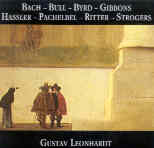This disc pays eloquent tribute to the duck-billed platypus of the Baroque period, the “claviorganum”–half-harpsichord, half-organ. How does it sound? Well, exactly like a harpsichord and an organ playing simultaneously, proving conclusively that the two exist on utterly independent planes of tone that never mix. This doesn’t mean that they don’t sound well together: in fact, the combination is quite lovely, with the timbre of the harpsichord dominating and the organ providing a softly sustaining resonance. It also goes without saying that in Gustav Leonhardt we have the best possible tour guide to this particular instrumental curiosity.
The first half of the program, featuring music by Hassler, Strogers, Bull, Gibbons, Pachelbel, J.C. Bach, and Ritter, belongs entirely to the claviorganum, anchored by three delightful pieces by William Byrd, with the Queen’s Alman especially eloquent. Bull’s Goodnight, by the eponymous composer, has an especially catchy principal tune, while the J.C. Bach Praeludium, actually a prelude and fugue, falls squarely in the tradition of that great family. Throughout, Leonhardt varies the sonority of the instrument, featuring strings and pipes separately and in combination, and the result is an aural feast far more varied in color than many other Baroque keyboard recitals.
The last three pieces on the program all come from J.S. Bach, and here Leonhardt has at his disposal a brilliant German two-manual harpsichord that makes the Fantasia BWV 1121, the brilliant early Aria variata (“in the Italian manner”) BWV 989, and the grand Partite sopra “O Gott, du frommer Gott” BWV 767 simply leap out of the speakers. This last work is particularly interesting: it’s usually performed as an organ work, as indeed Leonhardt recorded it the early 1970s for Seon (currently Sony). Heard on the harpsichord, the individual variations lose much of their customary solemnity, while Leonhardt’s judicious pacing and self-effacing musicianship project the work with exceptional contrapuntal clarity and rhythmic point. Alpha’s demonstration-class sound matches Leonhardt’s playing in communicativeness and intimacy. An exceptional recital of truly uncommon interest. [10/28/2004]
































